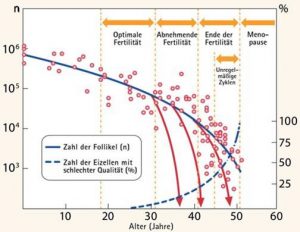Family Planning after 40
What would you say: At what age does it get more difficult for a woman to become pregnant? A survey conducted in 2007 found that more than 50 % of interviewees estimated that the likelihood of pregnancy declines from the age of 40 onward.
Unfortunately this is not true!
It is our duty at this point to provide you with truthful information and advice – even though we understand that this may seem confrontational and could sadden you. It isn’t easy to find the right balance between conveying medical facts and the prospects of success in an honest and open way, while at the same time hoping to reach out to you and offer emotional support at the right moment. However, it is possible and that is exactly what we are good at doing.
Women are most fertile between 20 and 30 years of age. The natural likelihood of pregnancy starts to drop from the age of 35
Impact of Women’s Age on the Quantitative and Qualitative Decline of Fertility

The number of maturing egg cells in the ovaries declines. Additionally, the oocytes are also affected by natural cell ageing. Unlike sperm, which is regularly regenerated, all of the egg cells each woman will ever have are already present in her ovaries when we are still in the womb – and they age as we do. So, if sperm encounters an aged egg cell, fertilisation failure is often the result. This means that the embryo does not nidate. Also, an increased number of embryos do not continue their normal development in the course of the pregnancy, which leads to high miscarriage and thus lower birth rates.
Fertility treatment is not able to compensate for the abovementioned factors, so that the number of solutions offered by reproductive medicine decline significantly for those over the age of 40. As our focus lies on the quality of the results, we prefer to use assisted reproductive techniques performed outside the body (IVF, ICSI treatment) starting from the age of 38 or 39.
Of course, it is important to keep one thing in in mind: the biological age of each patient is unique, so there may be hope in light of all the factors involved. There are certain examinations that can help when evaluating the chances of a possible pregnancy.
Blood tests are generally performed between the second and the fourth day of your menstrual cycle to determine the levels of FSH (follicle stimulation hormone), estradiol and AMH (anti-Müller hormone). In addition, a transvaginal ultrasound scanning of the ovaries will be carried out to identify the number of antral follicles present in the ovaries. In combination, these procedures provide a good picture regarding your individual fertility (so-called ferticheck).
What is most important to you and us is the birth rate per cycle ». At this point, we do not wish to communicate a pregnancy rate to you. This would only raise false hopes, as your success rate would be significantly lower later on due to a high miscarriage rate. We prefer to talk about birth rates – and these are very high at our practise!
When comparing the birth rates per cycle achieved at our practice with those of the German national IVF registry, we can give you hope. The average birth rate for women between 40 and 45 years in Germany (2000 to 2008) was 6.21%, while in Gelsenkirchen we can boast with a birth rate of 8.4%.